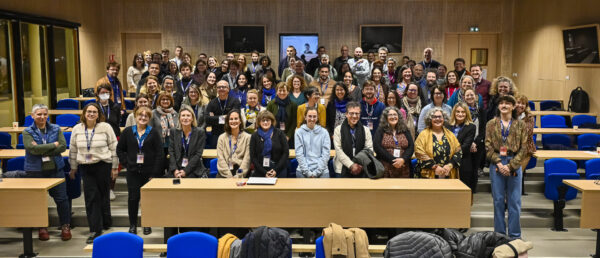The fourth meeting of HAL’s partners was held on 20 and 21 November at ENSSIB in Villeurbanne. A forum for HAL’s partners, this year’s event was attended by nearly 120 participants.
As with the previous session, the 2024 edition began with an institutional day presenting an overview of HAL’s current and future projects, followed on 21 November by a study day on the use of artificial intelligence tools in the context of research, publication and open science.
This post provides a summary of the first institutional day of the event, with presentations from various members of the CCSD, as well as the 5 newly elected members of the Partners Assembly, who were brought together especially for the occasion.
You can download the presentations from the programme of the 2024 Partners Assembly Sciencesconf.

The programme dor 21 November
The first institutional half-day, on 20 November, opened with a speech by Odile Contat, Head of the Department of Knowledge Dissemination and Documentation at the Ministry of Higher Education and Research. She presented the results of the national survey on open science policies implemented by French higher education and research institutions. This analysis, which is essential in order to better understand the dynamics at work, enabled us to take stock of progress and needs in terms of open access.
This was followed by a review of HAL’s projects in 2024, presented by Nathalie Fargier, Director of the CCSD, and Yannick Barborini, Head of Design and Development at HAL. These presentations provided an overview of the main achievements and prospects for 2025, including key statistics and structuring projects for the platform.
The day also marked the official launch of HAL Formation, the CCSD’s new training facility. Presented by Pascal Lubino, educational engineer at the CCSD, this space brings together all the resources and training offered by the CCSD to support HAL users in their practice
Finally, HAL’s Community Coordinators, Hélène Bégnis and Léo Raimbault, gave an update on the life of the Assembly of Partners and paid tribute to the four new institutions that have recently joined its ranks:
- The Academy of Sciences;
- ISAE ENSMA;
- ICN Business School;
- Université Catholique de Lyon;
This session was also an opportunity to warmly thank the six school representatives who took part in the “Open Science Policies for Schools” workshops. Since 2022, these workshops have attracted more and more members of the Assembly, with 126 participants registered in 2024.
Election year and new faces on the Steering Committee
HAL’s election year saw the official introduction of the five new members of the CCSD Steering Committee elected by the General Assembly. Their speeches highlighted their ambitions to strengthen the synergies between the CCSD, the partner institutions and the researchers who bring HAL to life on a daily basis.
These elected representatives occupy a key position as the link between HAL users, academic and research institutions and the CCSD Steering Committee. Their three-year mandate, granted by the members of the Assembly, enables them to act as spokespersons for the needs and expectations of the academic community. Working closely with the CCSD, they will help define the strategic direction of the HAL and its associated services, ensuring that the diversity of user priorities is fully reflected.
The richness of the discussions and the enthusiasm of the participants are testament to the collective momentum driving the HAL community. See you in a next post for the highlights of the Artificial Intelligence Scientific Day!